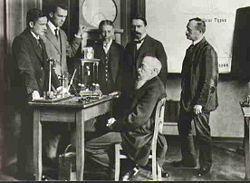Contents
- Fields of research
Fields of application
- Fields of research
- Fields of application
- Criticism and controversies
For many, the ultimate goal of psychology is to benefit human society through understanding human nature. This is a challenging enterprise since psychologists are also human beings, the same as their objects of study—psychology is the study of human beings by human beings. The complexity of the human being makes this even more difficult, and has led to numerous debates and splits within the discipline.
History of Psychology
Early psychology evolved out of both philosophy and biology. Discussions of these two subjects date as far back as the early Greek thinkers, including Aristotle and Socrates.
The word «psychology» itself is derived from the Greek word psyche, literally meaning «life» or «breath. » Derived meanings of the word include «soul» or «self
Throughout psychology’s history, various schools of thought have formed to explain the human mind and behavior. In some cases, certain schools of thought rose to dominate the field of psychology for a period of time.
- Structuralism: Wundt and Titchener’s structuralism was the earliest school of thought, but others soon began to emerge.
- Functionalism: The early psychologist and philosopher William James became associated with a school of thought known as functionalism, which focused its attention on the purpose of human consciousness and behavior.
- Psychoanalysis: Soon, these initial schools of thought gave way to several dominant and influential approaches to psychology. Sigmund Freud’s psychoanalysis centered on how the unconscious mind impacted human behavior.
- Behaviorism: The behavioral school of thought turned away from looking at internal influences on behavior and sought to make psychology the study of observable behaviors.
- Humanistic psychology: Later, the humanistic approach centered on the importance of personal growth and self-actualization.
- Cognitive psychology: By the 1960s and 1970s, the cognitive revolution spurred the investigation of internal mental processes such as thinking, decision-making, language development, and memory.
While these schools of thought are sometimes perceived as competing forces, each perspective has contributed to our understanding of psychology.
Criticism and controversies
A common criticism of psychology concerns its fuzziness as a science. Because some areas of psychology rely on «soft» research methods such as surveys and questionnaires, critics have claimed that psychology is not an objective science. Objectivity, validity, and rigor are key attributes in science, and some approaches to psychology have fallen short on these criteria.
On the other hand, greater use of statistical controls and increasingly sophisticated research design, analysis, and statistical methods, as well as a decline (at least within academic psychology departments) in the use of less scientific methods, have lessened the impact of this criticism to some degree.
Practice
Psychology is both an applied and academic field that benefits both individuals and society as a whole. A large part of psychology is devoted to the diagnosis and treatment of mental health issues, but that’s just the tip of the iceberg when it comes to the impact of psychology.
Some of the ways that psychology contributes to individuals and society include:
- Improving our understanding of why people behave as they do
- Understanding the different factors that can impact the human mind and behavior
- Understanding issues that impact health, daily life, and well-being
- Improving ergonomics to improve product design
- Creating safer and more efficient workspaces
- Helping motivate people to achieve their goals
- Improving productivity
Psychologists accomplish these things by using objective scientific methods to understand, explain, and predict human behavior. Psychological studies are highly structured, beginning with a hypothesis that is then empirically tested.
Notes
Did you know?
The term «Psychology» comes from Greek and means «study of the soul»
Beginning of the Scientific era

Wilhelm Wundt (seated) with colleagues in his psychological laboratory, the first of its kind

Meanwhile, during the 1890s, the Austrian physician Sigmund Freud developed a method of psychotherapy known as psychoanalysis. Freud’s understanding of the mind was largely based on interpretive methods, introspection and clinical observations, and was focused in particular on resolving unconscious conflict, mental distress, and psychopathology. Freud’s theories became very well-known, largely because they tackled subjects such as sexuality, repression, and the unconscious mind as general aspects of psychological development. These were largely considered taboo subjects at the time, and Freud provided a catalyst for them to be openly discussed in polite society. His work led to much controversy, even his own former colleagues rejecting some of his ideas. The Swiss founder of analytical psychology, Carl Jung, whom Freud at one time had hoped would carry «Freudianism» into the future, separated from him when Jung’s commitment to religion and mysticism, as evidenced in the significant role of the collective unconscious, conflicted with Freud’s atheism and commitment to science and the use of mechanical systems to explain human nature. This separation of two great figures impacted not only their own research and theoretical development, but also affected the development of psychology, leading to divergent schools regarding the conception of the human mind that remain separate to this day.
Rise and fall of Behaviorism
The rise of computer technology promoted the metaphor of mental function as information processing. This, combined with a scientific approach to studying the mind, as well as a belief in internal mental states, led to the rise of cognitive psychology.
Links between brain and nervous system function were also becoming common, partly due to the experimental work of those such as Donald O. Hebb and neuroscientist Charles Sherrington, and partly due to studies of people with brain injury. With the increasing involvement of other disciplines (such as philosophy, computer science and neuroscience) in the quest to understand the mind, the umbrella discipline of cognitive science has been created as a means of focusing such efforts in a constructive way.
Humanistic movement
The history of this article since it was imported to New World Encyclopedia:
Note: Some restrictions may apply to use of individual images which are separately licensed.
External links
- Psychology.org
- American Psychological Association
- Association for Psychological Science
- British Psychological Society
- Cummings Center for the History of Psychology
- Classics in the History of Psychology
- What is Psychology?
- Resources & Tools for Psychology Students
What Is Psychology?
Psychology is the study of mind and behavior. It encompasses the biological influences, social pressures, and environmental factors that affect how people think, act, and feel.
Gaining a richer and deeper understanding of psychology can help people achieve insights into their own actions as well as a better understanding of other people.
It’s difficult to capture everything that psychology encompasses in just a brief definition, but topics such as development, personality, thoughts, feelings, emotions, motivations, and social behaviors represent just a portion of what psychology seeks to understand, predict, and explain.
Types of Psychology
- Abnormal psychology is the study of abnormal behavior and psychopathology. This specialty area is focused on research and treatment of a variety of mental disorders and is linked to psychotherapy and clinical psychology.
- Biological psychology (biopsychology) studies how biological processes influence the mind and behavior. This area is closely linked to neuroscience and utilizes tools such as MRI and PET scans to look at brain injury or brain abnormalities.
- Clinical psychology is focused on the assessment, diagnosis, and treatment of mental disorders.
- Cognitive psychology is the study of human thought processes including attention, memory, perception, decision-making, problem-solving, and language acquisition.
- Comparative psychology is the branch of psychology concerned with the study of animal behavior.
- Developmental psychology is an area that looks at human growth and development over the lifespan including cognitive abilities, morality, social functioning, identity, and other life areas.
- Forensic psychology is an applied field focused on using psychological research and principles in the legal and criminal justice system.
- Industrial-organizational psychology is a field that uses psychological research to enhance work performance and select employees.
- Personality psychology focuses on understanding how personality develops as well as the patterns of thoughts, behaviors, and characteristics that make each individual unique.
- Social psychology focuses on group behavior, social influences on individual behavior, attitudes, prejudice, conformity, aggression, and related topics.
Potential Pitfalls
There’s a lot of confusion out there about psychology. Unfortunately, such misconceptions about psychology abound in part thanks to stereotyped portrayals of psychologists in popular media as well as the diverse career paths of those holding psychology degrees.
Sure, there are psychologists who help solve crimes, and there are plenty of professionals who help people deal with mental health issues. However, there are also psychologists who:
- Contribute to creating healthier workplaces
- Design and implement public health programs
- Research airplane safety
- Help design technology and computer programs
- Study military life and the psychological impact of combat
No matter where psychologists work, their primary goals are to help describe, explain, predict, and influence human behavior.
ИсторияПравить
Журнал Psychologies был основан во Франции в 1970 году. В 1997 году его новым владельцем и руководителем стал Жан-Луи Серван-Шрайбер (фр. Jean-Louis Servan Schreiber). Сегодня журнал занимает второе место во Франции по популярности после Marie Claire.
В 2004 году Hachette Filipacchi Médias приобрела 49% капитала Finev.
В 2005 Psychologies открыли для себя читатели ещё пяти стран мира — Италии, Испании, Бельгии, Великобритании и России. Российская версия журнала запущена в декабре 2005 года издательским домом «Hachette Filipacchi Shkulev» (ныне «Hearst Shkulev Media»).
В 2006 и 2007 годах были созданы китайские и румынские издания.
В 2008 году Largardère Active выкупите из оставшихся 51% капитала Finev, и было создано мексиканское издание.
ТиражПравить
Тираж достиг 320 000 экземпляров в 2005 году.
A Word From Verywell
As you can see, while psychology may be a relatively young science it also has a tremendous amount of both depth and breadth. The assessment, diagnosis, and treatment of mental illness are central interests of psychology, but psychology encompasses much more than mental health.
Today, psychologists seek to understand many different aspects of the human mind and behavior, adding new knowledge to our understanding of how people think as well as developing practical applications that have an important impact on everyday human lives.
Psychology works to help people improve their individual well-being and thrive in an increasingly complex world.
- American Psychiatric Association. Diagnostic and Statistical Manual of Mental Disorders, 5th ed.. Washington, DC: Author; 2013.
- Hothersall D. History of Psychology, 4th ed. New York: Mcgraw-Hill; 2003.
:max_bytes(150000):strip_icc()/IMG_9791-89504ab694d54b66bbd72cb84ffb860e.jpg)
By Kendra Cherry
Kendra Cherry, MS, is an author and educational consultant focused on helping students learn about psychology.
Thanks for your feedback!








